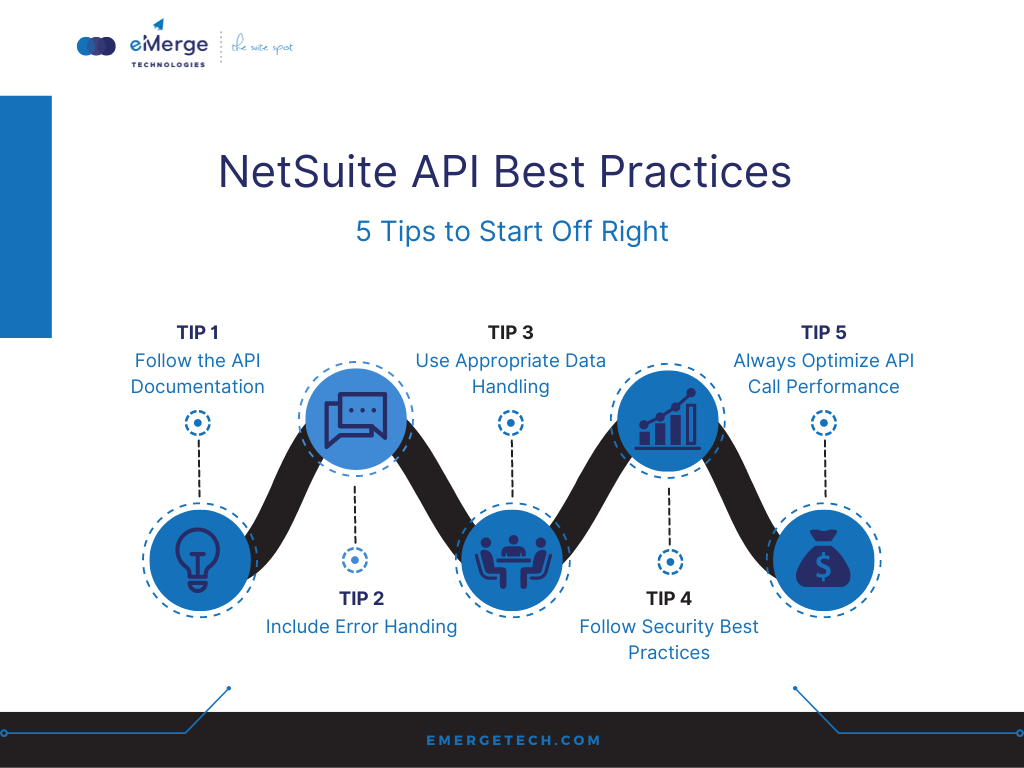- CALL : (+1) 407-273-1001
- Main Office : (+1) 407-273-1001
- NetSuite NetSuite Integration
- Dec 23
- 8 mins read
NetSuite API 101: The 2023 Complete Guide
NetSuite API 101
Welcome to “NetSuite API 101: Demystifying the Power of the NetSuite API”! If you’re new to NetSuite or just starting to explore the possibilities of the API, this article is for you. The NetSuite API can be a powerful tool for integrating and automating your business processes, but it can also be intimidating for those who are unfamiliar with it. That’s where this guide comes in. We’ll break down the basics of the NetSuite API, explain how it works within the NetSuite platform, and provide tips for setting up and accessing the API.
By the end of this article, you’ll have a solid foundation for using the NetSuite API to improve your business operations. So let’s get started!
What is the NetSuite API and What Does it Do?
NetSuite API (Application Programming Interface) is a set of protocols, routines, and tools for building software and applications. It allows different systems to communicate with each other and exchange data in a standardized format.
The purpose of the NetSuite API is to enable integration and automation within the NetSuite platform. It allows developers to access and manipulate data within NetSuite, as well as to automate business processes and workflows. This can help streamline operations, reduce errors, and improve efficiency within an organization.
Meet an Integration ExpertGet Integration Quote
Examples of some things that are possible with the NetSuite API
- Integrating with a third-party CRM system: The NetSuite API can be used to integrate NetSuite with a third-party CRM system, such as Salesforce or Microsoft Dynamics. This can allow businesses to synchronize customer data, sales data, and other information between the two systems.
- Automating data entry and validation: The NetSuite API can be used to automate data entry and validation tasks within NetSuite. For example, you could use the API to automatically import data from a third-party system or to validate data before it is entered into NetSuite.
- Creating custom reports and dashboards: The NetSuite API can be used to create custom reports and dashboards within NetSuite. This can allow businesses to track and analyze data in new and more powerful ways.
- Automating financial processes: The NetSuite API can be used to automate financial processes within NetSuite, such as generating invoices, reconciling accounts, or processing payments.
- Integrating with e-commerce platforms: The NetSuite API can be used to integrate NetSuite with e-commerce platforms, such as Shopify or Magento. This can allow businesses to synchronize data between their online store and their back-office systems.
What are the Different Types of NetSuite API?
SuiteTalk
SuiteTalk uses a set of APIs (Application Programming Interfaces) that are available to developers. These APIs are based on the Simple Object Access Protocol (SOAP), which is a standardized protocol for exchanging data over the web using Extensible Markup Language (XML).
Some of the key features and benefits of SuiteTalk include:
- Data access: SuiteTalk allows developers to access and manipulate data within NetSuite, such as customer and vendor records, sales orders, and financial transactions.
- Custom integrations: SuiteTalk can be used to create custom integrations between NetSuite and other systems, such as third-party applications or databases.
- Automation: SuiteTalk allows developers to automate business processes and workflows within NetSuite, such as creating custom reports and dashboards, or automating data entry and validation.
- Scalability: SuiteTalk is designed to scale to meet the needs of large and complex organizations, with support for multiple users and a high level of security.
The purpose of SuiteTalk is to provide developers with the tools and resources they need to access and manipulate data within NetSuite, as well as to automate business processes and workflows. It is a powerful tool for integrating and automating various aspects of a business’s operations within the NetSuite platform.
SuiteScript
SuiteScript is based on JavaScript, a widely-used programming language that is familiar to many developers. It allows developers to create custom scripts and functions within NetSuite that can be triggered by specific events, such as the creation of a new record or the submission of a form.
Some of the key features and benefits of SuiteScript include:
- Custom logic: SuiteScript allows developers to create custom logic within NetSuite, such as custom validation rules, data transformations, or custom reports and dashboards.
- Automation: SuiteScript can be used to automate business processes and workflows within NetSuite, such as data entry and validation, or triggering specific actions based on certain events.
- Integration: SuiteScript can be used to integrate NetSuite with other systems, such as third-party applications or databases.
- Scalability: SuiteScript is designed to scale to meet the needs of large and complex organizations, with support for multiple users and a high level of security.
The purpose of SuiteScript is to provide developers with the tools and resources they need to create custom business logic within NetSuite, as well as to automate business processes and workflows. It is a powerful tool for enhancing the functionality and capabilities of the NetSuite platform.
RESTlet
RESTlet is a server-side API (Application Programming Interface) for the NetSuite platform that allows developers to create custom integrations using the REST (Representational State Transfer) architectural style. REST is a standardized way of designing web APIs that is based on HTTP (Hypertext Transfer Protocol) and is designed to be easy to use and scalable.
Some of the key features and benefits of RESTlet include:
- Custom integrations: RESTlet allows developers to create custom integrations between NetSuite and other systems, such as third-party applications or databases.
- RESTful design: RESTlet follows the principles of REST, which makes it easy to use and understand, as well as scalable.
- Automation: RESTlet can be used to automate business processes and workflows within NetSuite, such as data entry and validation, or triggering specific actions based on certain events.
- Integration: RESTlet can be used to integrate NetSuite with other systems, such as third-party applications or databases.
The purpose of RESTlet is to provide developers with the tools and resources they need to create custom integrations between NetSuite and other systems using the REST architectural style.
How to Setup and Access the NetSuite API
In order to use the NetSuite API, developers must first obtain API access and set up the necessary credentials. Here are the general steps for obtaining and setting up API access:
- Determine which type of NetSuite API you want to use (e.g. SuiteTalk, SuiteScript, RESTlet).
- Ensure that your NetSuite account has the necessary permissions to use the API. This typically requires administrative privileges.
- Obtain an Account ID, which is a unique identifier for your NetSuite account. You can find this in the Account Preferences section of the Setup menu in NetSuite.
- Create a role and permission set specifically for API access. This will allow you to control which users have access to the API and what actions they are allowed to perform.
- Generate an API key. This will be used to authenticate your API requests. You can generate an API key in the Integrations > Manage Integrations section of the Setup menu in NetSuite.
- Install and configure the necessary software and libraries. Depending on the type of NetSuite API you are using, you may need to install and configure specific software or libraries in order to use the API. For example, you may need to install a SOAP library if you are using SuiteTalk, or a JavaScript runtime environment if you are using SuiteScript.
- Test your API access and credentials. Once you have set up your API access and configured the necessary software and libraries, you should test your API access and credentials to ensure that everything is working correctly.
Meet an Integration ExpertGet Integration Quote
Error Checklist for Beginners to Troubleshoot
- Check your API credentials: Make sure that you have the correct Account ID, API key, and other credentials. Double-check that they are entered correctly and that they have the necessary permissions to access the API.
- Check your software and libraries: Make sure that you have installed and configured the necessary software and libraries for the API you are using. For example, if you are using SuiteTalk, you may need to install a SOAP library.
- Check your API endpoint: Make sure that you are using the correct API endpoint for your NetSuite account. The API endpoint will depend on your NetSuite edition (e.g. Standard Edition, Professional Edition, etc.) and your location. You can find the correct API endpoint in the Integrations > Manage Integrations section of the Setup menu in NetSuite.
- Check for errors: Look for any error messages or exceptions that may be returned by the API. These can often provide clues about what is causing the issue.
- Check the API documentation: Review the API documentation to make sure that you are using the API correctly. The API documentation can be found in the NetSuite Help Center.
- Check for network issues: Make sure that there are no network issues or connectivity problems that could be causing the API to fail. This can include issues with firewalls, proxies, or other network configurations.
- Check for rate limiting: Some NetSuite APIs have rate limits, which limit the number of API requests that can be made within a specific time period. If you are encountering rate limiting issues, try reducing the frequency of your API requests.
- Check for permissions issues: Make sure that the user or account you are using has the necessary permissions to access the API. This may involve creating a new role or permission set specifically for API access.
- Check for SSL/TLS issues: If you are using a secure connection (HTTPS) to access the API, make sure that your SSL/TLS configuration is correct. This can include issues with SSL certificates or certificate validation.
- Check for encoding issues: Make sure that you are properly encoding and decoding any data that is being sent or received via the API. This can include issues with character encoding or special characters.
- Check for timeouts: If you are experiencing timeouts when making API requests, try increasing the timeout value or retrying the request after a short delay.
- Check for third-party issues: If you are using a third-party library or integration to access the NetSuite API, make sure that it is configured and working correctly.
- Check the NetSuite status page: If you are experiencing issues with the NetSuite API, check the NetSuite status page to see if there are any known issues or maintenance periods that could be causing the problem.
Tips and Best Practices for Using the NetSuite API

- Follow the API documentation: The NetSuite API documentation provides detailed information about how to use the API and what is possible with it. Make sure to read and follow the documentation carefully to ensure that you are using the API correctly.
- Use appropriate error handling: Make sure to include error handling in your code to catch any exceptions or errors that may occur when using the API. This can help to prevent issues from occurring and make it easier to debug problems if they do arise.
- Use appropriate data validation: Make sure to validate any data that you are sending to or receiving from the API. This can help to prevent errors and ensure that the data is consistent and accurate.
- Use appropriate security measures: Make sure to follow best practices for security when using the API. This can include using secure connections (HTTPS), properly encoding and decoding data, and following the NetSuite security guidelines.
- Use appropriate performance optimization techniques: Make sure to optimize the performance of your API calls to ensure that they run efficiently and don’t impact the overall performance of the system. This can include minimizing the number of API calls, using caching techniques, and following the NetSuite performance guidelines.
NetSuite API Documentation and Other Resources
- The NetSuite Help Center: This is the official documentation for the NetSuite API and provides detailed information about how to use the API and what is possible with it.
- The NetSuite Developer Network: This is a community forum for NetSuite developers, where you can ask questions, find solutions to common problems, and learn from other developers.
- The NetSuite Developer Blog: This is the official blog for NetSuite developers, where you can find articles, tutorials, and other resources to help you learn about the NetSuite API and how to use it effectively.
- The NetSuite Developer Account: This is a testing environment for NetSuite developers, where you can try out the NetSuite API and experiment with different configurations and integrations without affecting your production data.
- The NetSuite Developer Toolkit: This is a set of tools and resources for NetSuite developers, including libraries, code samples, and documentation, to help you get started with the NetSuite API.
Meet an Integration ExpertGet Integration Quote
Wrapping Up
In conclusion, the NetSuite API is a powerful tool for integrating and automating business processes within the NetSuite platform. With the right knowledge and resources, it is possible to use the API to streamline operations and improve efficiency.
If you have any questions about the NetSuite API or are interested in using it to improve your business operations, please leave a comment below. Our team at eMerge Technologies is always happy to help. If you need help with a NetSuite integration project, don’t hesitate to reach out to us. Our team of experts has the experience and knowledge to help you get the most out of the NetSuite API and achieve your business goals.
Finally, if you have want to learn more about everything NetSuite integration, check out our Complete NetSuite Integration Guide.
Jeremy McCourt is an content producer in the enterprise software industry that focuses on NetSuite and related cloud-based software solutions.
Related Posts

NetSuite Training 101 (The 2023 Complete Guide)
NetSuite training is an underrated and often overlooked part of the NetSuite ecosystem. In this article, we do what we can to break down why NetSuite training is a critical part of NetSuite users finding…
- Aug 21
- 6 mins read

What is NetSuite Customization? The 2023 Complete Guide
NetSuite, as a leading cloud-based ERP system, has gained immense popularity among businesses worldwide. However, to truly harness its potential, customization is often necessary. In this comprehensive guide, we delve into the world of NetSuite…
- Aug 16
- 6 mins read
